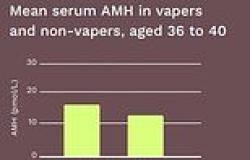By Gavin Madeley for the Daily Mail
Published: 01:51 GMT, 4 March 2019 | Updated: 01:55 GMT, 4 March 2019
5 shares
33
View
comments
We may like to think our choice of life partner is based on nothing more scientific than a shared physical attraction and an ability to laugh at each other’s jokes.
But researchers have found that people are unwittingly drawn to those with a similar life expectancy to them.
It seems humans also unconsciously select mates who share similar risks of illnesses such as high blood pressure or heart disease.

Researchers have found that people are unwittingly drawn to those with a similar life expectancy to them (file picture)
Experts at the University of Edinburgh say the findings help explain why long-term couples often suffer from the same ailments in later years and can have similar life spans.
They examined data from the UK Biobank - a major study of genes and lifestyle factors linked to health that involves more than half a million people.
The team looked at information from the parents of couples and found that even in-laws shared genetic risk factors for diseases and had a similar longevity.
The similarities are greater than would be expected by chance, experts said, suggesting people inadvertently choose a mate who shares the same disease risks as themselves.
Given that many ailments are not visible when people choose their partners, experts say the surprising finding is most likely a result of choosing a mate with shared lifestyle factors that are genetically linked to disease.
Joint risk behaviours such as smoking, or healthy behaviours like maintaining a healthy weight, are most likely to lead to shared diseases in later life and, ultimately, a similar life expectancy, experts believe.
Professor Albert Tenesa, of the university’s MRC Human Genetics Unit, said: ‘Our study suggests that humans tend to select partners for behavioural or physical traits that are genetically related to disease and







